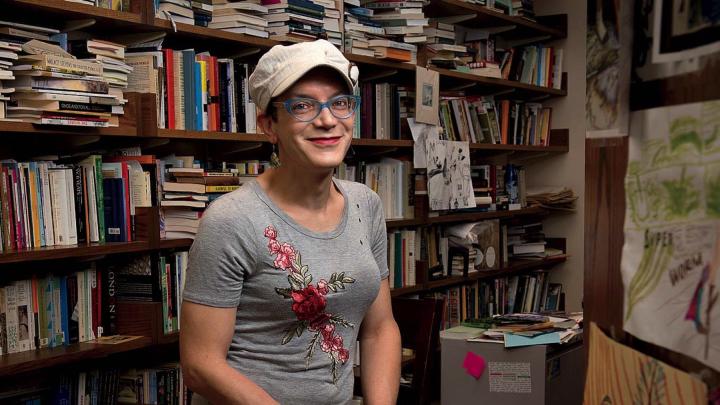Professor of English Stephanie Burt ’94 is the kind of poetry critic who provokes anger in other poetry critics. Called a “kingmaker” by The New York Times Magazine in 2012, Burt writes often for the Times, but also for The London Review of Books and The Times Literary Supplement. She’s the kind of poetry critic who shapes how readers think of the literary climate, through projects like The Poem Is You, her anthology of 60 worthwhile works of contemporary poetry, and through several books of literary scholarship and her own volumes of verse (the most recent, Advice from the Lights, was released this October).
Success alone can stoke negative sentiments in competitors, but Burt’s particular critical persona—gracious and enthusiastic, verging on hyperbolic—has made her a target. “Gleeful and gorgeous,” Burt wrote of Angie Estes’s collection in 2009; “Few writers have shown at once the vividness and the evasions of memory so well,” Burt characterized Killarney Clary. In 2013 (before Burt began exclusively using female pronouns), a New Republic critic complained that Burt “strains enough superlatives to make his praise seem cheap.” The piece claimed that Burt spent too much time explaining how a poem worked, rather than deciding whether or not a poem was worth reading, and let the audience down by refusing to sort the great from the good from the bad. Burt responded in the online arts review Partisan that as a poetry critic, she was more concerned with looking for originality than defining works as major or minor. “If I look only for greatness,” Burt wrote, “for what’s likely to ‘change the conversation’ or last a hundred years or demonstrate mastery or advance the whole art, I’m going to miss a lot of what’s pleasing, enlightening, beautiful, now.”
The question of what is “worth” reading can be incredibly fraught, and Burt is keenly aware of how her personal biases may color her evaluations. This summer, she was named co-poetry editor of The Nation (along with Carmen Giménez Smith), a weekly with a longstanding reputation for being a sort of intellectual standard-bearer for the American left. When asked in August about how she would approach her new position, she launched into an explanation about how the poetry ecosystem has become more demographically diverse in recent decades, and rattled off a list of her own identities: transgender, Harvard-educated, Jewish, white. These social markers, she said, will affect her taste when choosing poems for the magazine. Burt later explained by email, “If I read and love a poem about trans lady identity and fighting transmisogyny, or about raising a toddler, or about watching Maya Moore shoot three-pointers, or about the Dark Phoenix saga, or about reading Gerard Manley Hopkins, I can’t be entirely sure whether it’s a great poem, or just an OK poem that I like because I’m drawn to the subject.”
Nonetheless, she thinks that disentangling the influence of her own personal tastes from her judgment of a poem’s worth and value is vital, especially given recent changes in American poetry. “To do a good job of understanding where American poetry is in general,” she said, “and choose poems that I want to recommend to strangers, I get to—and have to—think about the experience of people of color more than I thought I would have to when I got into this line of work.”
As poetry editor, Burt will act as an advocate not only for diverse poetry but also for the magazine’s readers. “We expect to receive (and therefore, probably, to publish) some poems in harmony with the progressive mission in the front of the magazine, because in a giant universe of poets who could send their work anywhere, poets who think about social justice a lot are incrementally more likely than others to send their work to The Nation, Burt wrote. “But I hope we won’t condescend or get predictable.”
This mindfulness is a skill she first developed while an undergraduate—but not while writing art reviews for The Harvard Crimson or discussing poetry at The Harvard Advocate, as one might suspect. The student paper taught her how to write on deadline, and the literary magazine provided her with a community, “but the thing that has most influenced my gatekeepership—where I learned to sort and select—was doing the radio show Record Hospital” on WHRB, then housed in the basement of Memorial Hall. “To do a good audio show, you have to keep the audience in mind. If you are doing a college radio show where you pick the records and you want to do it well, you have to think about what’s a discovery for you, what’s a discovery for your listeners, what your listeners expect, what will make them tune out, what will make them call you, what will make them say ‘Wow! What was that? That’s amazing,’ what will make them say, ‘That’s my favorite song and I haven’t heard it in five years.’”
Nonetheless, Burt felt ready to take on these responsibilities again in her new position. “It’s a kind of power that I am okay with having and would like to wield responsibly and also collaboratively,” she says. “It feels good.”









